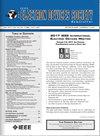Highly Uniform Low Gray AMOLED Pixel Using Stable Circuit and Duty Ratio Modulation Driving
IF 2
3区 工程技术
Q3 ENGINEERING, ELECTRICAL & ELECTRONIC
引用次数: 0
Abstract
In this paper, a new pixel circuit for active matrix organic light-emitting diode (AMOLED) display that can achieve high uniformity in low gray levels and its driving method are proposed. The proposed circuit compensates for threshold voltage variation of thin-film-transistors (TFTs), with the structure that minimizes the loss of sensed threshold voltage. However, the high current error rate in extremely low gray level is unavoidable, as the driving TFT (DRT) operates in subthreshold region, where the current difference caused by the threshold voltage variation can be severe. To suppress high error rates in low gray levels, the operation region of DRT is restricted to the saturation region, by adopting duty ratio modulation (DRM) method. With the DRM method, low gray is expressed with high current value and short emission time. The viability of the proposed circuit and its operation are analyzed with HSPICE. Compared to the conventional driving method, DRM significantly reduces the current error rate in low gray area. The proposed circuit is fabricated within 220利用稳定电路和占空比调制驱动高度均匀的低灰度 AMOLED 像素
本文提出了一种用于有源矩阵有机发光二极管(AMOLED)显示屏、可在低灰度级实现高均匀性的新型像素电路及其驱动方法。所提出的电路可补偿薄膜晶体管(TFT)的阈值电压变化,其结构可最大限度地减少感应阈值电压的损失。然而,由于驱动 TFT(DRT)工作在亚阈值区,阈值电压变化造成的电流差可能非常大,因此在极低灰度级时不可避免地会出现高电流误差率。为了抑制低灰度级的高错误率,通过采用占空比调制 (DRM) 方法,将 DRT 的工作区域限制在饱和区域。通过 DRM 方法,低灰度可以用高电流值和短发射时间来表示。我们利用 HSPICE 分析了拟议电路的可行性及其运行情况。与传统驱动方法相比,DRM 大大降低了低灰度区域的电流误差率。所提出的电路可在 220 $\mu {\mathrm {m} 内制作完成。}\440 次。电路的测量也验证了所提电路和 DRM 方法的能力。
本文章由计算机程序翻译,如有差异,请以英文原文为准。
求助全文
约1分钟内获得全文
求助全文
来源期刊

IEEE Journal of the Electron Devices Society
Biochemistry, Genetics and Molecular Biology-Biotechnology
CiteScore
5.20
自引率
4.30%
发文量
124
审稿时长
9 weeks
期刊介绍:
The IEEE Journal of the Electron Devices Society (J-EDS) is an open-access, fully electronic scientific journal publishing papers ranging from fundamental to applied research that are scientifically rigorous and relevant to electron devices. The J-EDS publishes original and significant contributions relating to the theory, modelling, design, performance, and reliability of electron and ion integrated circuit devices and interconnects, involving insulators, metals, organic materials, micro-plasmas, semiconductors, quantum-effect structures, vacuum devices, and emerging materials with applications in bioelectronics, biomedical electronics, computation, communications, displays, microelectromechanics, imaging, micro-actuators, nanodevices, optoelectronics, photovoltaics, power IC''s, and micro-sensors. Tutorial and review papers on these subjects are, also, published. And, occasionally special issues with a collection of papers on particular areas in more depth and breadth are, also, published. J-EDS publishes all papers that are judged to be technically valid and original.
 求助内容:
求助内容: 应助结果提醒方式:
应助结果提醒方式:


